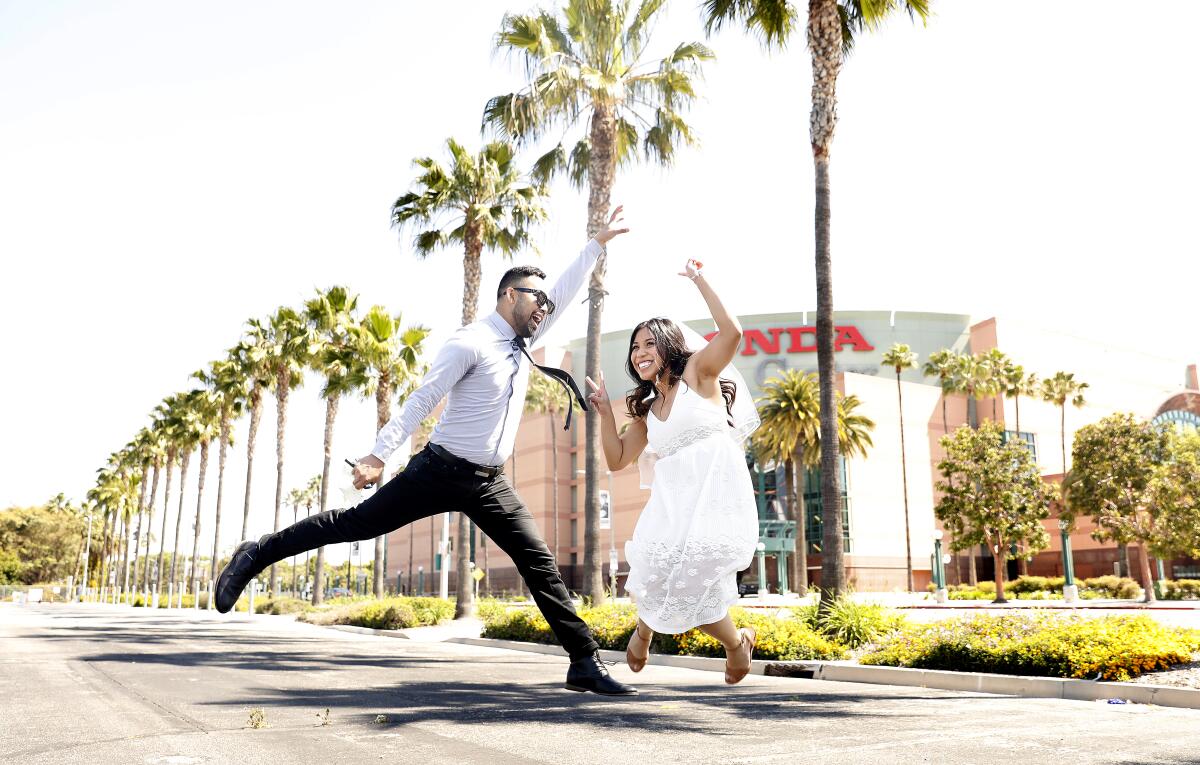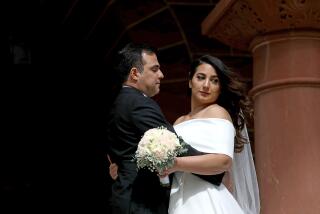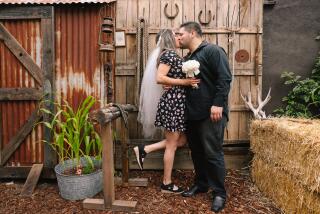Coronavirus halted legal marriages in L.A. County. It could be weeks before they resume

The Los Angeles County clerk’s office closed March 16 because of the spreading coronavirus, and it hasn’t issued a marriage license since, leaving many couples wondering when they can tie the knot.
Gov. Gavin Newsom last week signed an executive order allowing couples to legally wed through videoconferencing during the coronavirus pandemic, but unlike several other counties in Southern California, L.A. County is weeks away from having a system in place to accommodate that. One might not arrive until June, according to Mike Sanchez, a spokesman for the county clerk.
“It’s something we’re developing actively,” he said. “We know people are anxious to marry their loved ones, and we’re doing the best to our ability.”
Several officiants and wedding chapel operators in the county expressed frustration over the continued delay. A scarcity of marriage licenses means fewer marriages. And that means minimal work during what would have been the beginning of peak wedding season.
“People like me are sitting around, twiddling our thumbs, trying to figure out how we’re going to make our living now,” said Chris Robinson, who runs wedding services as the Officiant Guy.
Robinson is a notary public authorized by the county to officiate marriages, which entails signing a valid marriage license. Those licenses must be procured through the county. He said the county didn’t give notaries a warning about the closure, leaving him with a limited number of licenses on hand. Those quickly ran out. If a couple were to come to him with a valid license, he could officiate their marriage, but he can’t access new licenses.
All weddings that were scheduled to be held through June at St. Vincent de Paul, a Roman Catholic church in South Los Angeles, have been postponed, according to secretary Kevelyn Lucas. It’s one of many churches, synagogues and religious institutions in the metro area that have temporarily halted ceremonies.
Meanwhile, Orange County and Riverside County officials said teleconferencing systems for marriages would likely be up and running in a matter of days, although they agreed it wasn’t easy to immediately roll out a system that was safe and functional.
“It’s got to work,” Orange County Clerk-Recorder Hugh Nguyen said. “It’s stressful when you get the order at 5:15 on Thursday, and on Friday morning we get bombarded by phone calls.”
Both counties have systems in place to allow couples to obtain marriage licenses and wed in person — in Orange County, they can do so at an Anaheim stadium parking lot, and in Riverside County, the locations are a pair of currently unused movie ticket booths on opposite sides of the county.
Teleconferencing could extend the opportunity to wed to those who might not be able to make the journey for health reasons, including being at high risk for a serious case of COVID-19. Others may need to get married quickly to access healthcare through a spouse or to stay in the country as their visa expiration date nears.
“If you’re young, you just get behind the wheel and drive to another county. If you’re elderly and need to get married for insurance purposes, it’s really hard,” said Maria Kharlash, owner of Instant Marriage L.A., a weddings services company in Encino.
In some counties where marriage services are still available, including San Diego, Ventura and Kings, there are no plans to develop an electronic system. (San Diego’s services are offered only to county residents and military families.)
“We’re just going the usual-fashioned way,” Kings County Clerk-Recorder Kristine Lee said. She added that their lobby had glass in place and everyone was required to wear masks, which “does add a little more sense of security.”
Couples in Riverside County can put their names on a waiting list by phone or email to be first in line to take advantage of the coming teleconference service. To date, there are 53 couples on the list.
“We’re going into it thinking that it is potentially the new normal,” Assistant County Clerk-Recorder Michele Martinez-Barrera said. “So we want to make sure the process we put in place is not a temporary process, but a permanent process.”
Some couples, like Jasmynn and Joshua Abernathy, both 31, already opted to go digital with their vows, even though the ceremony wasn’t legally binding.
The Torrance couple had locked in a wedding venue for a planned ceremony on April 30. When the pandemic scuttled those plans, they decided to hold their ceremony on Zoom. The date, their three-year anniversary as a couple, was important to keep, they said.
Wearing masks and keeping their distance, the couple was wed by Joshua’s godfather.
“It worked; it served its purpose. It’s definitely weird because, in a moment like that, you want to be able to hug him [Joshua’s godfather]. That’s that kind of awkward distancing that all of us aren’t used to,” said Joshua Abernathy, who works in retail.
There was an unexpected benefit. With fewer in-person eyes trained on her, Jasmynn Abernathy, a therapist, said she felt less anxiety: “It felt like a quieter moment.”
In mid-May, they have an appointment to tie the knot legally in Orange County and another ceremony tentatively scheduled for the original venue in September. They’ve already begun using the same last name and believe the paperwork is just a formality at this point.
Others have opted to postpone their weddings in anticipation of a tomorrow when crowds can gather and a buffet isn’t viewed as a threat.
Christopher Powers, 35, and his fiancée, Lauren Bernd, 30, canceled their large destination wedding set for Sept. 5 in Spain. The Echo Park-based movie producers said they were holding off on rescheduling until the new normal came into better focus, including what international travel will entail.
As for a videoconference wedding? “That was never really going to be an option for us,” Powers said. “No disrespect to those who decide to go down this path, but a Zoom wedding is not going to satisfy anybody.”
The majority of couples scheduled to wed at the Temple Emanuel of Beverly Hills synagogue have rescheduled for a year or more out, said Rabbi Jonathan Aaron.
But a few are choosing not to delay. Aaron said he officiated two weddings early on in the coronavirus crisis. One was a legal wedding held in the temple’s sanctuary, with strict social distancing observed. The other was held over Zoom. The latter isn’t binding from a legal perspective, but he said it was official from a Jewish perspective.
“It’s ordained when it’s done under the eyes of God,” Aaron said, “not through paperwork.”
More to Read
Sign up for Essential California
The most important California stories and recommendations in your inbox every morning.
You may occasionally receive promotional content from the Los Angeles Times.











